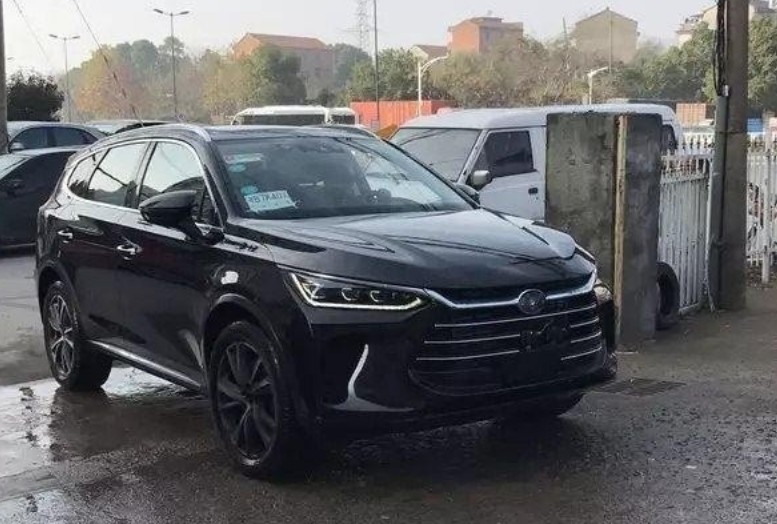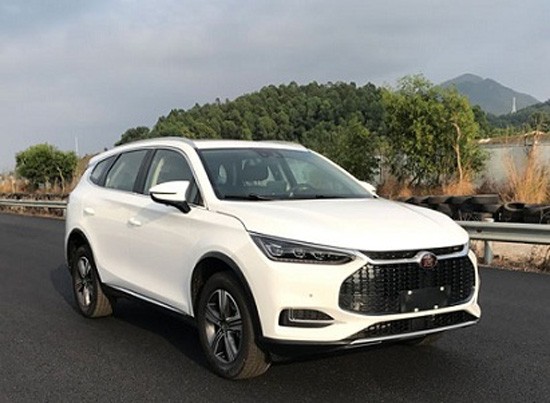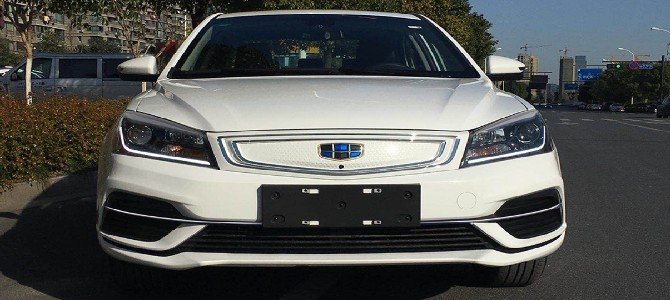
New BYD Tang
#1 in August
The Chinese PEV market hit its second best score this
year, with some 93,000 units registered in August, up only 62%, this slowdown from the three-digit growth rates of
previous months is explained by the fact that New
Energy subsidies were slashed to vehicles with range lower to 150 kms,
in June, so many small City EVs lost a large amount of sales.
In a falling mainstream market (-5% YoY), the
continued growth of the plugin market means that PEV share hit a new all-time best, ending the
month with 5.2%, while the 2018 share rose slightly, to 3.1% share, a new
record and well above the 2.1% of 2017, with sales expected to continue growing
as the year advances, the 2018 PEV share should end North of the 3% 4%
threshold (5%?), with December possibly reaching 7%.
Last month, the Chinese OEMs represented almost 50% of
all PEVs registered globally, an impressive number, that should increase during
2018.
With symbolic export numbers, the domestic market is
more than enough to absorb the current Chinese production, helped by the fact
that it is still a protected market and foreign OEMs hadn’t yet looked
seriously at this niche, but with PEV quotas to be fulfilled in the near
future, foreign brands are putting an effort, although this month, their share
was down 1%, to 6% share, due the sharp deliveries drop of Tesla (-70% YoY). Of
this (small) cake, 2% belong to Tesla (down 1%), and 2% to BMW, with the
remaining manufacturers sharing the final 2%.
In August, the headlining news were the new BYD Tang PHEV winning its first monthly
Best Seller award, while the Geely Emgrand
EV jumped to the Silver medal.
Here’s August
Top 5 Best Selling models individual performance:

#1 – BYD Tang PHEV: After only four months on the
market, the second-generation Tang won its first Best Seller award, thanks to 5,043 registrations, the nameplate’s
second best performance ever (record set in December’15, with 5,503 units).
Sales should continue strong for the successful sports-SUV, and a new personal
best could be achieved this year. As for the new generation, the BYD’s Cayenne saw the battery grow to 24 kWh,
originating an increased 100 kms range / 62 mi NEDC (around 70 kms / 44 mi real
world), while on the power department, things stayed the same, with some 500 hp
and 0-100 kms/h in less than 5 secs. All for CNY 279,800 / $40,816.

#2 – Geely
Emgrand EV: The
automaker bread and butter sedan got
some updates and most importantly, a new battery (52 kWh) and motor (160 hp),
increasing its range to 400kms / 250 mi NEDC (around 280 kms / 175 mi), and
sales have reflected this, with 4,647 units
in August, its best month since 2016. The best-selling Chinese brand (and Volvo
owner) is betting on the model strongpoints, like its quality and technology, that
compensate a middle-of-the-road design and price (CNY 218,300 / $31,834).

#3 – Chery
eQ: Chery was
one of the Chinese brands to bet early in plug-ins, having won the models title
three times in a row (2011, ’12, ’13), with its tiny QQ3 EV, now the automaker
is trying to regain relevance with the eQ, the spiritual (and material)
successor to the QQ3, having registered 4,613 units in August (year best), allowing it to collect another
Top 5 position last month. A vehicle marketed to city dwellers, for USD 24,000
before incentives, you get a funky city EV, with the 22kWh battery providing
just enough range (200 kms / 125 miles NEDC), to cover the needs of
the urban jungle.

#4 – BYD Yuan EV: We all knew that BYD’s new Baby Crossover was destined for success,
and with 4,487 deliveries in August
in only its third month on the market, the BAIC EC-Series should have a
fearsome competitor here. Are we witnessing the rise of the 2019 Best Selling
model? I guess it will depend more on BYD’s ability/willingness to make them in
volume, than actual demand, sitting on the vortex of the two fastest selling
segments (Compact Crossovers and EVs), with unrivalled specs (42 kWh battery,
305 kms/190 mi NEDC range, 174 hp motor), and price (25,000 USD), BYD might
have found in this new model its star player, crowning what it is already a
strong lineup.

#5 – JAC iEV S/E: JAC was
one of the EV pioneers in China, selling plug-ins since 2010, and now it’s back
at the game, registering 4,450 units last month. With a
competitive price of USD 26,000 before incentives, this is a vehicle targeted
at trendy urbanites that for some reason can’t reach a BYD Song or Roewe’s
eRX5, getting in return a good-looking compact vehicle (Kia Soul-sized), with
just enough power and range (114 hp & 251 kms/156 mi) to not to make it
look bad. Interestingly, the word on the street is that JAC has export
ambitions…
 |
| Hawtai xEV |
2018 ranking
There were
several changes this month, the most important being the JAC iEV S/E climbing
one position to Third Place, while both the Chery eQ and Geely Emgrand EV
jumped three positions, to #7 and #8, respectively.
But the
Climber of the Month was the BYD Tang, surging to #16, up 4 positions, with the
Sports SUV looking for a Top 10 in 2018.
Other models
on the rise were the Roewe Ei5, going up one position (#12), while the Hawtai
EV160 is slowly, but steadily, climbing the ranking latter, now up to #13.
Two new
models joined the Top 20, with the BYD Yuan EV jumping to #19 (will it reach
the Top 10 this year?), and making it the 5th BYD on the ranking,
while the Hawtai xEV is now #20, confirming Hawtai as the current market Dark Horse, no one mentions them, but
they are making their way…
Outside the
Top 20, a lot is going on, on the large sedan class, the Tesla Model S used to
rule with no real competition, but now the Geely Borui GE PHEV (2,455 units
last month) and BMW 530e (1,676) are leaving the Californian in the dust (288
deliveries for the Model S in August), and with the tariff war between the US
and China raging on, do not expect any recovery soon, leaving the BMW and Geely
alone for the race of the category best seller.
The Nio ES8
was the Best-Selling Luxury SUV last month (1,296 registrations), with the
Tesla Model X delivering less than 200 units, so the new startup model can have
a shot at removing Tesla from the yearly category leadership, it will be
interesting to see how this works out.
Looking at
the manufacturers ranking, BYD (20%, up 1%) is a comfortable leader, thanks to
the new Tang and Yuan, while the runner-up BAIC (13%, down 1%), is still losing
share, as the EC-Series struggles to get production in full swing, while the EX
& EU-Series are unable to fully compensate the EC drop.
In Third
Place, the Shanghai-based Roewe (11%) holds the last place of the podium, with
a significant advantage over the #4, Chery (6% share), and with BAIC now only 3%
above it, the SAIC brand is now going after the Silver medal.


Jose, it there any way to set up notifications for your new posts?
ReplyDeleteI think so, if you subscribe EVS on Google Plus.
DeleteI am subscribed to you personally on Google Plus, I am subscribed to EVS on Blogger, but I don`t understand how to subscribe to EVs on Google Plus. Can you send a link or something?
DeleteJose,
ReplyDeleteNo top 20?
Table now online, thanks for reminding me.
DeleteJose,
ReplyDeleteI think that less than 450,000 new Plug-In cars will be sold in China in the remaining 4 months in 2018.
Too bad that the 1 million milestone will not be reached in China in 2018.
Actually, I hope that I'm wrong.
Cheers
Jose, BAIC EC-Series resume its sales? Or is the old model?
ReplyDeleteIt's the new, longer range, EC3. They are gearing up production and September / October should have the EC-Series back at the best sellers list.
DeleteJose,
ReplyDeletePerhaps there were sold some Nissan Sylphy EV's in China in August 2018.
Do you have any information regarding the Nissan Sylphy?
No info so far, maybe in September.
DeleteWith Tesla cars having to pay a 40% import tax, Tesla sales will almost be dead until the end of this year. Good opportunity for other brands and their PHEV line up with an only 15% import tax, like BMW. But doing so, China gov is hurting a Trump opponent instead of helping them. Maybe they could twist the new tariffs, introducing an exception for car-makers that only produce EV cars. It would be a smart move, specially when they are negotiating with Tesla its first factory in China, and it would be also a slap on Trump's face...
ReplyDeleteThat's a good idea. +1
DeleteJose,
ReplyDeleteIt seems very likely now that VW will be an important player in the EV market in China during the next decade.
VW will start three new EV-factories together with it's joint-venture partner FAW in China. They will be located in Qingdao, Foshan and Tianjin.
VW is really investing heavily in China in order to be able to comply with the EV Quota set by the Chinese government.
As from 2025 VW will be producing 1.5 million Plug-In cars in China together with its two joint-venture partners FAW and SAIC.
The EV sales numbers in the next decade will be of another level than the EV sales numbers in the current decade.
Cheers
I agree, i guess it's a question of survival for VW, because they are by far the largest carmaker in China, the quotas system will be more demanding for them, volume-wise, than for others, so if they want to keep to be #1, they need to be ambitious on EVs in China, there's simply no other way.
DeleteDang. No individual model or company's sales are particularly impressive, but they have A TON of models and companies working on selling EVs, it seems, at least compared to everywhere else in the world.
ReplyDeleteWhat's the marketshare of each type in China - BEV vs PHEV vs HEV vs ICE vs other?
What about NIO?
ReplyDeleteAround 1,000 units.
DeleteThe China Passenger Cars Association indicates 507,356 sales for the first 8 month (http://autonews.gasgoo.com/new_energy/70015152.html). It begins to make a noticeable difference with your estimate. You don't count commercial vehicules, but maybe you include some other than just passenger cars (like light commercial vehicules)?
ReplyDeleteKandi didn't make the list, as usual?
ReplyDeleteYes, Kandi is on the low hundreds per month.
Delete